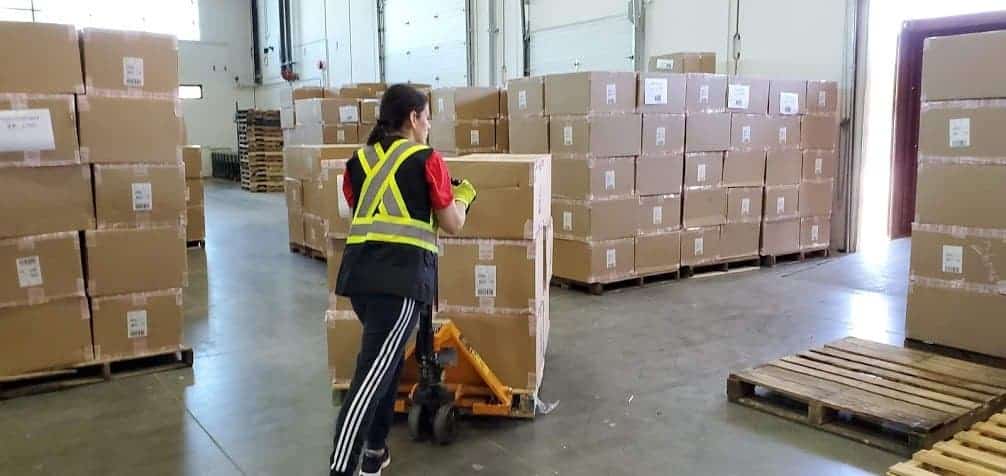Embracing Automation and Robotics
Automation and robotics are revolutionizing the logistics industry, and lumpers must adapt to these changes:
- Collaborative Robots (Cobots): Cobots can work alongside lumpers, handling repetitive or heavy tasks, allowing lumpers to focus on more complex activities.
- Automated Sorting Systems: Advanced sorting systems can increase the speed and accuracy of processing goods, reducing manual effort and improving overall efficiency.
- Training in Robotics: Lumpers should receive training on how to operate, troubleshoot, and maintain robotic systems to ensure seamless integration into daily operations.
Advanced Data Analytics
The use of advanced data analytics can significantly enhance the decision-making process and operational efficiency:
- Predictive Maintenance: Utilizing predictive analytics to forecast when equipment will need maintenance can prevent unexpected breakdowns and reduce downtime.
- Inventory Optimization: Advanced analytics can help optimize inventory levels, ensuring that stock is available when needed while minimizing excess.
- Performance Tracking: Real-time data collection and analysis can provide insights into individual and team performance, identifying areas for improvement and recognizing top performers.
Enhancing Employee Engagement
High levels of employee engagement can lead to increased productivity, job satisfaction, and retention:
- Feedback Mechanisms: Implementing regular feedback mechanisms, such as surveys and suggestion boxes, can help lumpers feel heard and valued.
- Recognition Programs: Establishing recognition programs to celebrate achievements and milestones can boost morale and motivation.
- Professional Development: Offering opportunities for continuous learning and professional growth can help lumpers advance their careers and stay engaged.
Navigating Regulatory Changes
The logistics industry is subject to numerous regulations that impact the role of lumpers:
- Compliance Training: Regular training on current and upcoming regulations ensures that lumpers are aware of and adhere to necessary compliance standards.
- Documentation and Reporting: Effective systems for maintaining and reporting required documentation can streamline compliance and reduce the risk of violations.
- Adapting to Changes: Staying informed about regulatory changes and adapting operations accordingly can prevent disruptions and maintain smooth workflows.
Focus on Sustainability
Sustainability is increasingly important in logistics, and lumpers can play a key role in promoting eco-friendly practices:
- Energy-Efficient Practices: Implementing energy-efficient practices in warehouse operations, such as optimizing lighting and heating, can reduce energy consumption.
- Sustainable Packaging: Using recyclable and biodegradable materials for packaging can reduce waste and environmental impact.
- Carbon Footprint Reduction: Implementing strategies to reduce the carbon footprint of logistics operations, such as using electric vehicles and optimizing transportation routes.
Building a Resilient Workforce
Resilience is crucial for handling the dynamic and often unpredictable nature of logistics:
- Cross-Training: Cross-training lumpers in various roles can enhance flexibility and ensure that operations continue smoothly during staff shortages or peak periods.
- Emergency Preparedness: Developing and practicing emergency response plans can help lumpers effectively handle disruptions, such as natural disasters or pandemics.
- Mental Health Support: Providing mental health resources and support can help lumpers cope with stress and maintain overall well-being.
Leveraging Digital Transformation
Digital transformation is reshaping logistics, and lumpers must adapt to new digital tools and processes:
- Mobile Applications: Using mobile applications for real-time communication, tracking, and task management can improve efficiency and coordination.
- Cloud-Based Solutions: Implementing cloud-based systems for inventory management and data storage can enhance accessibility and collaboration.
- Digital Training Programs: Offering digital training programs can ensure that lumpers are proficient in using new technologies and staying current with industry trends.
Conclusion
Lumpers are an indispensable part of the logistics and warehousing industry, playing a critical role in ensuring the efficient movement of goods through the supply chain. As the industry continues to evolve, lumpers must adapt to new technologies, regulatory changes, and sustainability initiatives. By embracing automation and robotics, leveraging advanced data analytics, enhancing employee engagement, navigating regulatory changes, focusing on sustainability, building a resilient workforce, and leveraging digital transformation, the logistics industry can elevate the role of lumpers and ensure their continued importance.
The future of lumpers is promising, with opportunities for growth, development, and innovation. By investing in their training, well-being, and professional development, the industry can create a more efficient, safe, and rewarding environment for these essential workers. As the logistics sector evolves, the significance of lumpers will continue to grow, underscoring their indispensable contribution to global commerce. Through continuous improvement and innovation, the profession can offer sustainable and fulfilling career opportunities for those who undertake this critical work.


